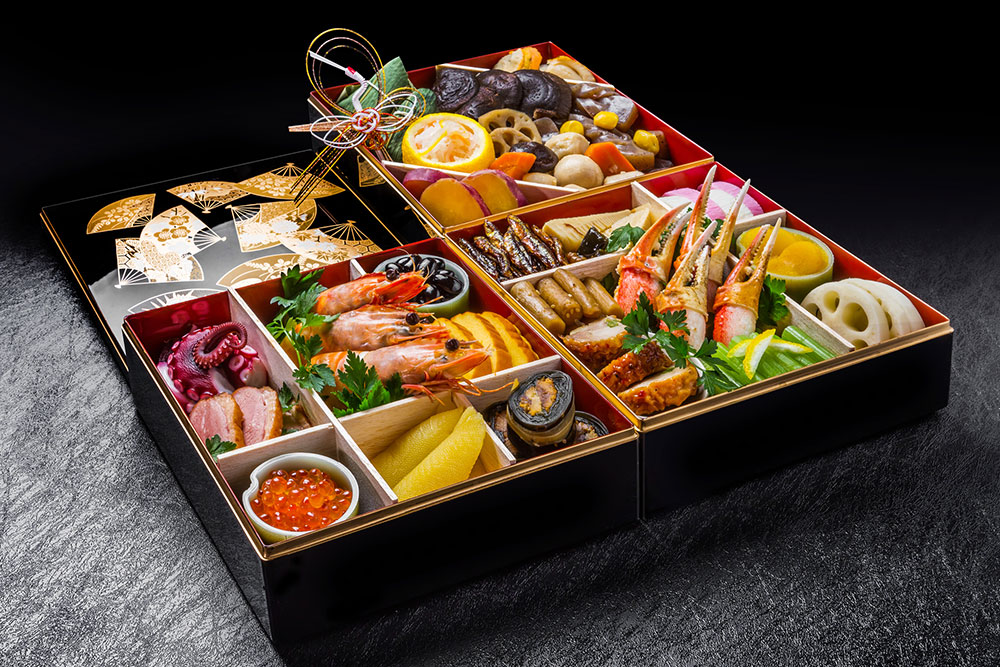
「おせちってどういう意味?」と、 ソヨンがケンに聞いています。「おせち料理」って英語で何ていうのか、これはロブに聞いてもわかりません。ここは、自分で知っている英単語を駆使して、説明するしかないよ、ケン。さて、どう説明するのかな?そして、ジウから注目の一言が!
Today's Point
今日のポイント 多くは、英語の辞書に載っていなかったり、「お寿司」のようにそのまま“Sushi”だったりします。そのため、自分自身の言葉で説明する必要があります。こんなときに便利な「パラフレーズ(言い換え)」のコツを伝授します。
多くは、英語の辞書に載っていなかったり、「お寿司」のようにそのまま“Sushi”だったりします。そのため、自分自身の言葉で説明する必要があります。こんなときに便利な「パラフレーズ(言い換え)」のコツを伝授します。

Story of the Day
今日のストーリーWhat does “osechi” mean?
| Ken : Long time no see, So Yong. | ケン : 久しぶり、ソヨン。 |
|---|---|
| So Yong : Hello, Ken. How’s Cebu treating you? |
ソヨン : こんにちは、ケン。 セブでの生活はどう? |
| Ken : It’s great. I love it here. |
ケン : 最高だよ。 僕はセブが大好きなんだ。 |
| So Yong : Are you going back to Japan soon? | ソヨン : 近いうちに日本に帰るの? |
| Ken : I’ll go back for a week for the New Year holidays. | ケン : 正月に1週間帰るんだ。 |
| So Yong : Are you looking forward to it? | ソヨン : 楽しみにしてるの? |
| Ken : Yeah. I’m especially looking forward to osechi. | ケン : うん。特におせちが楽しみだよ。 |
| So Yong : What does “osechi” mean? | ソヨン : 「おせち」ってどういう意味? |
| Ken : It’s traditional Japanese food served during New Year. | ケン : 正月に食べる伝統的な日本料理なんだ。 |
| So Yong : I see. So... Is Jiu your girlfriend yet? |
ソヨン : そうなのね。 ところで、ジウはあなたのガールフレンドなの? |
| Ken : Uh... Well... | ケン : それは、ええと… |
| Jiu : Yup, I am! | ジウ : そうよ! |

Quick Advice
ワンポイント・アドバイス

パラフレーズ(言い換え):
日本固有の文化や食べ物の伝え方ですが、まず第一段階としてその言葉が大枠でどんなものなのかを伝えます。次に第二段階として、その言葉の特徴を付け加えます。以下、参考にしてください。

第一段階:大きな分類を伝えます。例えばそれは、食べ物? 行事? モノ?
第二段階:特徴を付け加えていきます。大きさは? 色は? 使い方は? 時期は? など。
これを「おせち」に当てはめてみましょう。

第一段階:
食べ物 ⇒ food
第二段階:
特徴を付け加える。
日本料理 ⇒ Japanese food
特別な食べ物(伝統的な食べ物) ⇒ special (traditional) food
お正月のための ⇒ for New Year
 従って、“Osechi is traditional Japanese food for New Year.”となります。どうでしょう。「今日のストーリー」でケンが説明に使った英語とあまりかわらないですよね。
従って、“Osechi is traditional Japanese food for New Year.”となります。どうでしょう。「今日のストーリー」でケンが説明に使った英語とあまりかわらないですよね。

もうひとつ「忘年会」は?

第一段階:行事つまりパーティー ⇒ a party
第二段階:特徴を付け加える
いつ行われる? ⇒ 年末 ⇒ year-end
追加情報 例えば、日本では一般的 ⇒ common in Japan
“Bonen-kai is a year-end party common in Japan.”
日本語から英語に定着している単語は多いですね。 特に日本で一般的な物・事が多いようです。
| ✔ emoji | 「絵文字」 |
|---|---|
| ✔ tsunami | 「津波」 |
| ✔ karaoke | 「カラオケ」 |
| ✔ tofu | 「豆腐」 |
| ✔ karoshi | 「過労死」 |
| ✔ manga | 「(日本の)漫画」 |
 “yes”“no”の幾つかのカジュアル表現は非常によく使われています。
“yes”“no”の幾つかのカジュアル表現は非常によく使われています。Yes: Mm, Uh-huh, Yeah, Yep
No: Huh-uh, Uh-uh, Nope
Key Phrase
キーフレーズRepeat after your teacher.
What does _____ mean?
Vocabulary / Expressions
ボキャブラリーと表現Repeat after your teacher.
- treating
- specially
- traditional
- native
- holidays
Exercise A
エクササイズ ARead the conversation aloud with your teacher. Fill in the blanks with a, b and c.
After that, fill in the blanks with your own words and practice the conversation with your teacher.

| So Yong : Are you going back to Japan soon? |
|---|
| Ken : I’ll go back for a week for the New Year holidays. |
| So Yong : Are you looking forward to it? |
| Ken : Yeah. I ______ to have osechi. (a. can’t wait b. am dying to c. am excited) |
| So Yong : ______? (a. What’s that b. What is “osechi” c. Is that a type of food) |
| Ken : It’s traditional Japanese food served during New Year. |
Exercise B
エクササイズ B (Vocabulary Building)Choose the correct word from the box.
- treating
- especially
- traditional
- native
- holidays
- Japan has many _______. Golden Week is an example.
- Kimono is a _______ Japanese garment.
- I really like ramen. ________ shoyu ramen.
- I like the company. The people are ______ me nicely.
- The Yamato tribe are ______ Japanese people.
Exercise C
エクササイズ CSituation : Explain what osechi-ryori is to your teacher.
